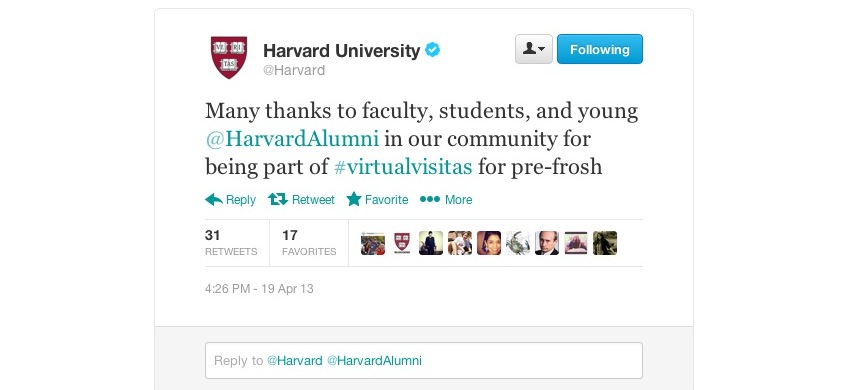With Admitted Student Weekends Disrupted, Universities Went Online
As universities shuttered their campuses and canceled activities during Friday’s lockdown, prospective students who had come from around the country for open house visits suddenly found themselves stranded and without answers to the many questions that would influence their college decision.
After acceptances get sent out, April is typically the final push for universities to lock in their new freshmen class by inviting them to campus through scheduled open houses. But as the manhunt began, suspending much of the travel to and from Boston and requiring that much of the city stay inside, schools with scheduled admitted students weekends, including Boston University, Harvard, Tufts, and Northeastern quickly pulled the plug on their events.
To cope, Both Harvard and BU took their prospective student outreach online. Representatives and students who volunteer in the Admissions Office began posting on the BU Class of 2017 Facebook page and using the hashtag #BU2017 on Twitter, offering to answer questions for students who were either stranded in Boston or hadn’t begun their journey here yet. But it didn’t stop there.
“Once I realized that this was starting to go viral in the BU community—when other current students, alumni, staff members, and other departments started offering to join in and help—I decided to created the Google spreadsheet so we could have a resource to help organize what was going on,” said Gordon Ryan, digital and social media marketing manager for BU Admissions.
The document, which was created around 10:25 a.m., had grown to around 450 students and alumni by 7 p.m., according to Ryan, as more and more of the BU community found links to the document through social media.
“We’re thrilled, to say the least. I’m humbled,” Ryan said. “While I knew there would be a core group of our Admissions students who would help out to some extent, I did not anticipate such an outpouring of help from the entire BU community.”
At Harvard, too, current students, alumni and faculty were reaching out to prospective freshmen through the hashtag #virtualvisitas. The Harvard Crimson also reported that students stepped up to lead unofficial tours and answer questions on Saturday for prospective freshmen and their families that had made it to Boston.
At Tufts, where Dean of Undergraduate Admissions Lee Coffin estimated about half of the 800 expected visitors made it to Boston for the school’s Jumbo Days open house, the event was restructured and moved inside for safety.
“We offered them an abbreviated program – the welcoming remarks, a student-to-student conversation and a spontaneous presentation by Tufts’ president – while we assessed the external situation,” Coffin said.
Rather than outright reschedule it, BU, Harvard and Tufts are already working on providing alternatives to the missed weekend.
“We’re already talking about a virtual open house and how we can give them [the prospective students] as close to the same experience online as we do when they are on campus,” Ryan said of BU’s plans.
Similarly, Coffin said Tufts is “planning to videotape elements of this Friday’s Jumbo Day to share with students from last week.”
Northeastern University, which also canceled its open house, has already rescheduled it for Sunday, April 21.
Colleges pay close attention to their yield, and given the violence and tragedy that occurred in Boston, coupled with the canceled accepted students’ days, it’s fair to wonder whether universities will have more trouble than usual attracting the students they’ve admitted this year.
According to John Baworowsky, current vice president for Enrollment Management at Dominican University of California, Boston should prove resilient in the end.
“It doesn’t implicitly speak to the nature of the safety of Boston or to the people who live in Boston,” said Baworowsky, who has worked in college admissions and higher education for about 30 years. “From what I see, Boston has always been a very popular location with some of the best colleges in America, so I suspect that they will recover.”
Baworowsky said, however that acts of violence do play into the decision process.
“I think it affects the parental influence in the process,” he said, as parents “take a closer look at campus safety.”
But quality of education remains a strong factor as well. Baworowsky said that college attendance in New York City following the September 11th attacks remained strong due to the quality of education, and that he expected a similar reaction in Boston.
“People rally around schools and institutions when stuff like this happens and they tend to do fine,” he said.
Ryan said he has already seen a reaction along these lines from prospective students.
“Nearly all the students I have talked to or seen posts from through social media have expressed that they are even more excited to come to BU and to Boston because of how strong the sense of community is both within the university and throughout the city,” he said. “Bad things can happen anywhere, at any school; they know that when they come here, they become part of a community they can count on.”



